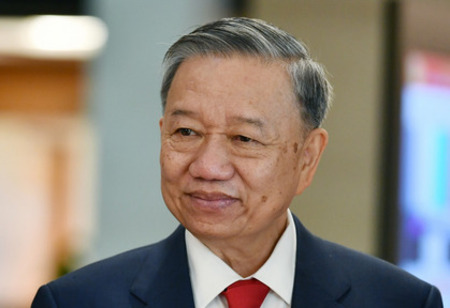
Party Chief Urges Removal of Barriers to Resolution 57


The conference, organized by the Central Steering Committee for the Development of Science, Technology, Innovation and Digital Transformation, seeks to assess how Resolution 57 regarding advances in science, technology, innovation, and national digital transformation has been carried out over the past nine months.
Party General Secretary To Lam, serving as Head of the Steering Committee, highlighted that executing Resolution 57 represents a primary focus and essential catalyst for strategic advances, thereby changing the nation's development approach and creating a new growth framework consistent with the principles of the 13th Party Central Committee's 13th session.
Also Read: Japan to Appoint First Permanent Representative Focusing on WTO
He commended the work of various levels and departments, noting the Central Steering Committee's crucial function in directing and overseeing implementation with tangible outcomes. He also expressed gratitude to both local and international specialists and Vietnamese citizens abroad for their backing of Resolution 57.
The official emphasized the importance of rigorously following the guidance from the 13th Party Central Committee's 13th session, maintaining schedules without postponement or evasion, quickly tackling delayed responsibilities, and securing adequate resources for the initiative, targeting substantial and quantifiable achievements instead of superficial documentation.
Also Read: Indonesia's Tempe, Cassava Could be the Answer to the Global Staple Food Insecurity Crisis
There is a requirement to establish an ecosystem and actively harness social resources, positioning enterprises as the focal point to completely utilize private resources for scientific and technological advancement, along with innovation, he stated.
He stated that the satisfaction and trust of citizens and businesses should serve as the measure of success, advocating for complete digitalization of procedures and the establishment of comprehensive public services through connected data systems.
He mandated the adoption of an innovative implementation governance framework for complicated and multi-sector initiatives in the upcoming phase. He emphasized that all organizations, particularly leadership, must demonstrate exemplary behavior and remain answerable to the Party, the State, and the citizens for task execution, guaranteeing prompt completion, practical applicability, and successful outcomes.
Also Read: China is Fighting Pollution, Poverty with Bamboo?
Party institutions at all levels from national to regional must execute their digital transformation strategies for Party organizations efficiently and adhere to the established timeline, he continued.
The Party leader highlighted the significance of carefully overseeing the progress and standards of national databases, the effective utilization and allocation of government budget resources, and the tangible results of science and technology commercialization. He additionally advocated for independent and meaningful social oversight and input regarding the standards of scientific research, innovation, digital public services, and the deployment of national databases that directly affect citizens.
Every Steering Committee member and sector leader should embody a forward-thinking and model attitude—genuinely practicing "speak less, do more, with determination and efficiency." They are required to execute programs within their departments and organizations while providing the Steering Committee with suggestions for measures that deliver advantages extending beyond their individual sectors.
The Party leader emphasized that a resolute, clear, and uniform methodology is essential for carrying out these significant strategic directions.

